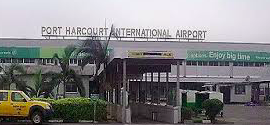 Nigeria’s President Muhammadu Buhari, commissioned the US $600m Port Harcourt International Airport Terminal in Nigeria funded by Export-Import Bank of China.
Nigeria’s President Muhammadu Buhari, commissioned the US $600m Port Harcourt International Airport Terminal in Nigeria funded by Export-Import Bank of China.
Speaking during the commissioning of the airport, the President said opening of the new terminal building of the Port Harcourt International Airport represents a significant landmark for international air travelers, particularly from the south-south geopolitical zone, and the entire country.
“Today’s commissioning is an example of Government’s deliberate policy to sustain the development of infrastructure for economic growth in all geo-political zones of the country,” said His Excellency Muhammadu Buhari.
President Buhari also praise the efforts of the Federal Ministry of Transportation, the Chinese government and the China Exim Bank for their financial support of US $500m and the various roles they played towards the successful completion of the project. The additional US $100m counterpart fund came from the government of Nigeria.
The terminal which commenced in February 2014, was constructed by China Civil Engineering and Construction Company (CCECC). The company is also constructing new terminals in Abuja, Kano and Lagos International Airports.
Global aviation standards
President Buhari also assured that his administration is deliberately working to sustain the development of infrastructure for economic growth in all geo-political zones. According to Rivers State Governor, Chief Nyesom Ezenwo Wike, the new airport terminal building will boost the economy of Rivers State as well as create jobs for people of the state.
As part of the infrastructure renewal program, the construction of 4 new international terminals at Abuja, Lagos, Port Harcourt and Kano airports was embarked upon by the federal government with a view to modernizing the aging airport infrastructure to meet global aviation standards and improved service delivery in tandem with best international practices.
The new commissioned terminal has the capacity for seven million passengers annually, 15 times the number of total passengers for entire Ghana for emphasis. In Nigeria aviation remains the safest means of transportation. Under current administration of President Muhammadu Buhari, transport sector continues to undergo series of reform to sustain international best practice to ensure safety and security.
Source: Construction Review


 The new statistics, recently released by the Nigerian Civil Aviation Authority (NCAA), showed stability, improved safety, robust regulatory oversight, increase passenger volume, more applications and renewals of the Air Operators Certificate (AOC) among others.
The new statistics, recently released by the Nigerian Civil Aviation Authority (NCAA), showed stability, improved safety, robust regulatory oversight, increase passenger volume, more applications and renewals of the Air Operators Certificate (AOC) among others.